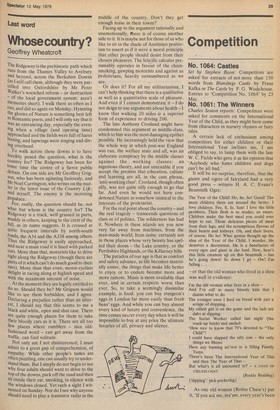Whose country?
Geoffrey Wheatcroft
The Ridgeway is the prehistoric path which runs from the Thames Valley to Avebury and beyond, across the Berkshire Downs (as I still call them, although they were parcelled into Oxfordshire by Mr Peter Walker's wretched reform — or destruction — of the local government system; aren't memories short). I walk there as often as I can, and did so again on Monday. Hymning the glories of Nature is something best left to Romantic poets, and I will only say that it Was an entrancing day, especially the evening when a village (and opening time) approached and the fields were full of hares boxing, and lapwings were singing and diving overhead.
To walk across those downs is to have forcibly posed the question, what is the country for? The Ridgeway has been for some time the centre of a fierce public debate. On one side are Mr Geoffrey Grigson, who has been agitating furiously; and Mr Noel Carrington, who writes on the matter in the latest issue of the Country Lift; and myself. The enemy is the motoring Populace.
For, really, the question should be, not What but whom is the country for? The Ridgeway is a track, well grassed in parts, muddy in others, keeping to the crest of the hill, as its name suggests. It is crossed at quite frequent intervals by north-south roads, the A34 and the A338 among others. Thus the Ridgeway is easily approached, and near a main road it is lined with parked cars. More than that, motorists like to drive right along the Ridgeway (though there are parts of it which can't do much good to their ears). More than that even, motor-cyclists delight in racing along at highish speed and With the maximum amount of noise.
At the moment they are legally entitled to do so. Should they be? Mr Grigson would like to see them forbidden, and I agree. Declaring a prejudice rather than an interest, I should say that this seems to me a black and white, open and shut case. There are quite enough places for them to take their bloody cars as it is. There are all too few places where ramblers — nice oldfashioned word — can get away from the traffic, can find solitude.
Not only am I not disinterested; I must admit to a great gap of comprehension, of empathy. While other people's tastes are Often puzzling, one can usually try to understand them. But I simply do not begin to see Why four adults should want to drive to the top of the downs, park off the road and then Sit inside their car, smoking, in silence with the windows closed. Yet such a sight I witnessed on Sunday. Nor do I see why anyone should need to play a transistor radio in the middle of the country. Don't they get enough noise in their towns?
Facing up to the argument rationally and unemotionally, there is of course another side to it. It is maybe not for those of us who like to sit in the shade of Austinian positivism to assert as if it were a moral principle that other people should desist from their chosen pleasures. The felicific calculus presumably operates in favour of the chain smoking, gawping motorists and against us pedestrians, heavily outnumbered as we are.
Or does it? For all my utilitarianism, I can't help thinking that there is a qualitative as well as a quantitative scale of pleasure. And even if I cannot demonstrate it — I do not deign to use arguments about health — I know that walking 20 miles is a superior form of experience to driving 200.
The late Anthony Crosland might have condemned this argument as middle-class, which to him was the most damaging epithet possible. He increasingly held the view that the whole way in which post-war England Was run, the welfare state and all, was an elaborate conspiracy by the middle classes against the working classes: an ingenious theory, and not untenable if you accept the premiss that education, culture and learning are all, in the cant phrase, 'anti-working class'. Crosland, though often silly, was not quite silly enough to go that far. And even he would not have condemned Nature as somehow inimical to the interests of the proletariat.
For the real point about the country — and the real tragedy — transcends questions of class or of politics. The wilderness has had it. Nowhere in these islands are you now very far away from machines, from the man-made world, from noise: certainly not in those places whose very beauty has spelled their doom — the Lake country, or the Perthshire Highlands, or the Killarney hills.
The paradox of our age is that as comfort and safety advance, as life becomes materi ally easier, the things that make life better to enjoy or to endure become more and more remote. Music is more available than ever, and in certain respects worse than ever. So, to take a seemingly dissimilar example, is food: you can buy sturgeon's eggs in London far more easily than fresh' hens' eggs. And while you can buy almost every kind of luxury and convenience, the time comes nek.rer every day when it will be impossible to buy at any price the ultimate luxuries of all, privacy and silence.


































 Previous page
Previous page